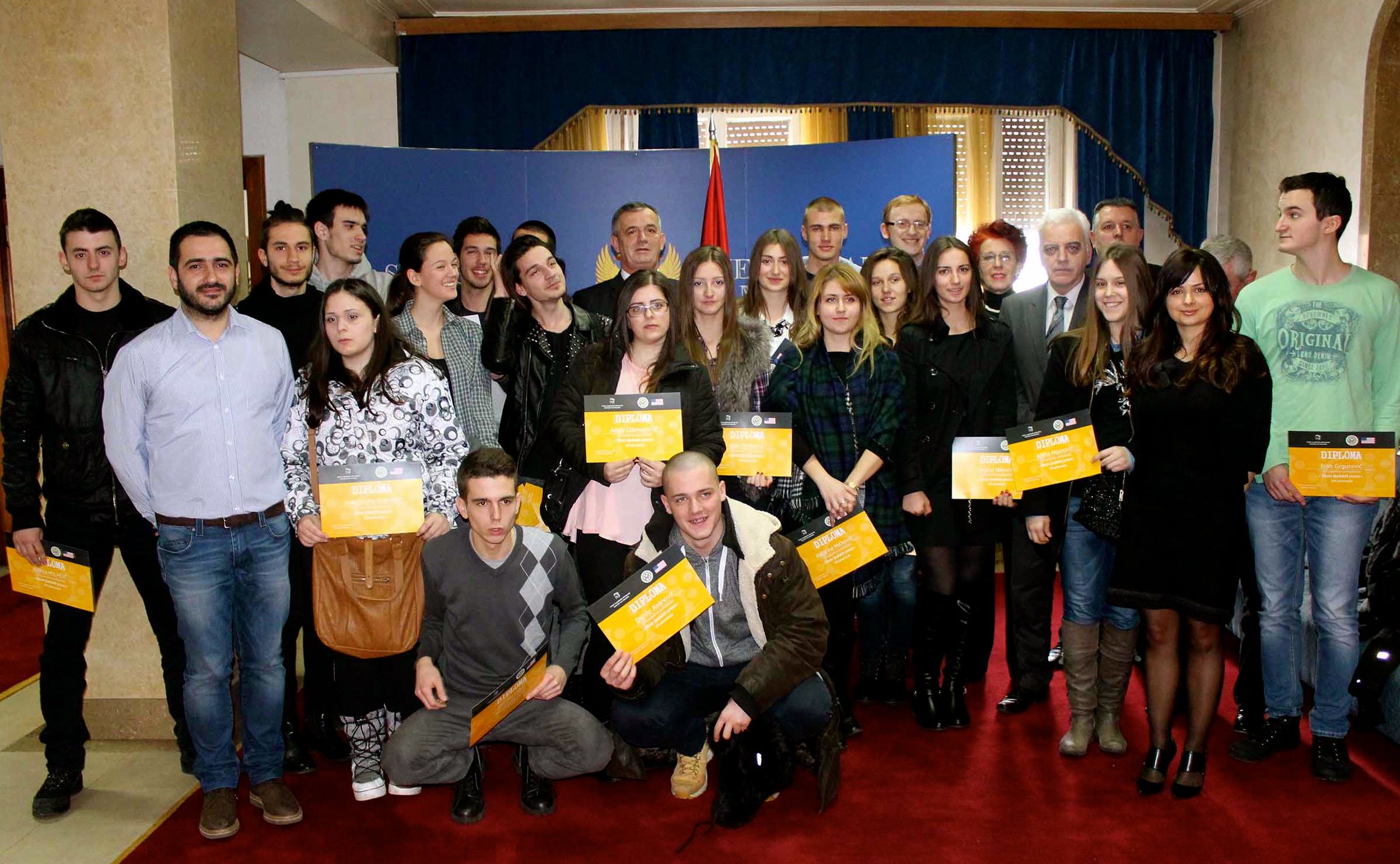Centre for civic education (CCE), with the support of the US Embassy, implements the project «Youth build Montenegro», within which the work of XIX generation of Human Rights School is organised.
Within the framework of work of XIX generation of Human Rights School, a visit was organised today to the institutions dealing with promotion and protection of human rights – Police Department and Parliamentary Committee for human rights and freedoms, that were recognised as important factors of protection and improvement of human rights, in order to get acquainted participants of the School with their competencies, organisation and acting.
In the Police Department, Vojislav Dragović, Chief of Security Centre Podgorica, Svetozar Tošković, Chief forensic of Security Centre Podgorica and Dalibor Živković, Deputy Commander duty service Security Centre Podgorica, spoke with participants. Chief of Security Centre Podgorica welcomed participants and emphasized that the Security Centre makes efforts in order to secure respecting of human rights to the greatest extent possible, so that the citizens of Montenegro could feel secure. Svetozar Tošković carried out the participants through the premises of forensic science and acquainted them with techniques and equipment used in solving of different criminal offenses and discovering of perpetrators.
Within the visit to the Committee for human rights and freedoms of Parliament of Montenegro, participants of the School were welcomed by the president of Committee for human rights and freedoms dr Halil Duković, who explained the mandate of Committee in the consideration of issues related to human rights, with emphasis on minority rights. He added that this Committee performs control over harmonisation of Montenegrin legislation with European standards, with focus on human rights. Duković reminded that during 2014 the Committee considered 8 legal texts and 9 reports of organisations/institutions that deal with protection of human rights, but also developed intensive international activity in this area. “We must approach together to development of human rights and freedoms. If we do not cooperate on that level and do not share all the experiences we possess and do not implement them in practice, we will never reach the goal to which we all aspire. Today, we have most of the problems in the implementation of particular laws in practice. If we want to be a part of developed Europe, then we must act as Europeans”, Duković concluded.
Representative of the US Embassy Jan Krasny stated that the young ones are motors of changes and “that is why we supported the idea of CCE with pleasure and believe that these sort of projects help young people to channel their creative energy in a constructive manner”.
Executive director of the Centre for Civic Education (CCE), Daliborka Uljarević pointed out that the “Human Rights School was designed as a space in which the participants of all social groups should develop their relationship towards the humane, towards everything that is seen as protection of human rights and freedoms through learning, interaction, gaining experience, theoretic and practical knowledge.” She further added that, when it comes to realisation of human rights and freedoms, key problems of Montenegro remain “inefficient process of facing with the past, poor results of Montenegrin institutions in processing, discovering and sanctioning numerous and various assaults on civil sector members, whether they are members of media or NGOs, inadequate institutional response on bullying, domestic violence, especially over children and women, but also widely spread discrimination against marginalised groups, such as persons with disabilities, LGBT population, Roma etc.” Uljarević concluded that: “Maybe it is a general point, but we need social solidarity, civil consciousness and conscience, because by fighting for rights of others we fight for our rights.”
Participants were afterwards awarded with diplomas for successful attendance of School in Blue room of the Parliament of Montenegro. XIX generation of Human Rights School was successfully completed by 26 (twenty six) high school students from all over Montenegro, as follows: Aleksa Milačić, Aleksandra Vlahović, Amina Niković, Ana Drašković, Ana Knežević, Andrija Božović, Anđela Bojović, Anđela Žugić, Anja Pješivac, Anela Džemajlović, Balša Dragojević, Danilo Asanović, Darko Savović, Dino Radončić, Đorđije Lakić, Ivan Grgurević, Jasmin Pejčinović, Jelena Mijanović, Katarina Mićković, Mića Lučić, Milan Simeunović, Milica Bakrač, Nenad Konatar, Slavica Čavić, Svetlana Tomić and Vukašin Obradović.
Human Rights School provides broad theoretical and practical knowledge on the concept of human rights, affirms culture of human rights, by inspiring and motivating people to advocate their rights, as well as the rights of those who are not able to do so themselves and encourages them to influence society more directly in the future. Its objective is the establishment of continued alternative education on human rights. During past 18 generations, the School was completed by more than 500 citizens, political party activists, NGOs, state service officials from local and national level, journalists, students, and others who have shown interest to connect their acting with public scene and provide personal contribution to the realisation of human and minority rights in Montenegro.
Svetlana Pešić, programme associate

